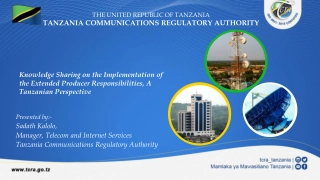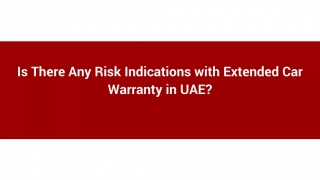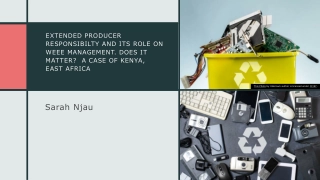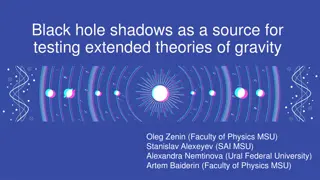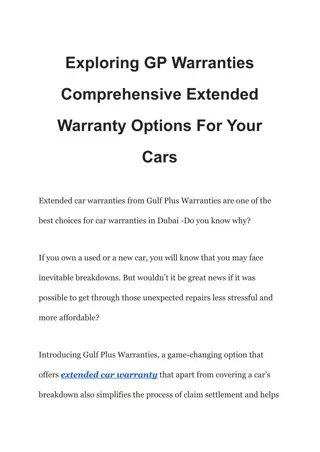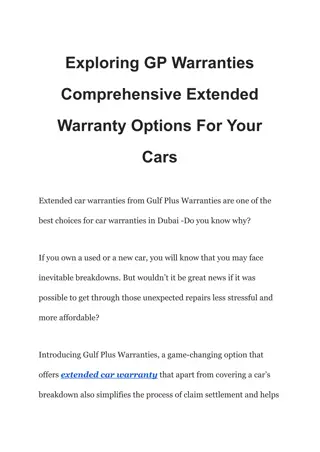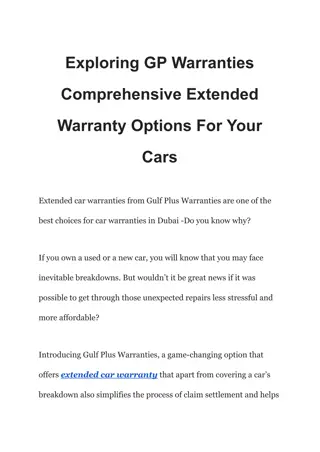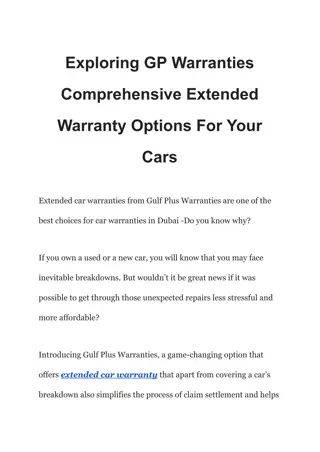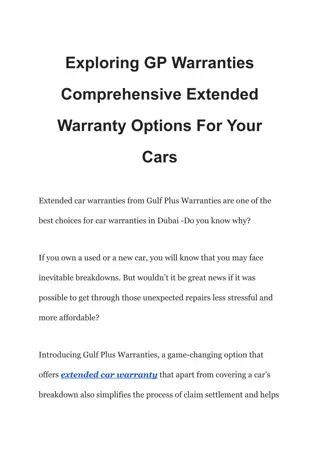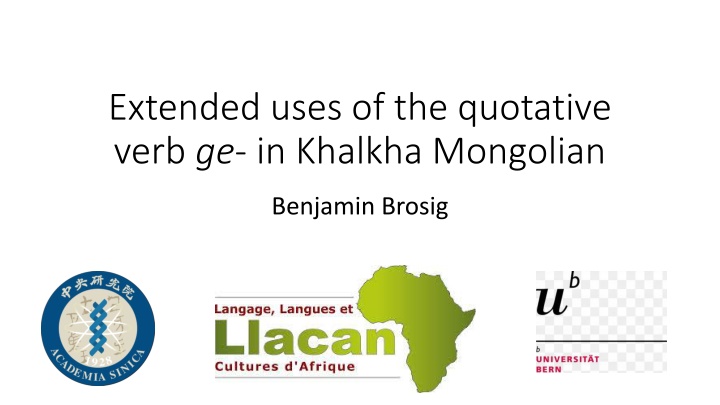
Extended Uses of Quotative Verb 'ge-' in Khalkha Mongolian
Explore the extended functions of the quotative verb 'ge-' in Khalkha Mongolian as analyzed through corpora and sentence data, including basic uses, topicalization, clause connection, additive focus, intention-related uses, and sentence-final stance. The study delves into various contexts where 'ge-' is employed, showcasing its versatility in discourse and metalinguistic reference.
Download Presentation

Please find below an Image/Link to download the presentation.
The content on the website is provided AS IS for your information and personal use only. It may not be sold, licensed, or shared on other websites without obtaining consent from the author. If you encounter any issues during the download, it is possible that the publisher has removed the file from their server.
You are allowed to download the files provided on this website for personal or commercial use, subject to the condition that they are used lawfully. All files are the property of their respective owners.
The content on the website is provided AS IS for your information and personal use only. It may not be sold, licensed, or shared on other websites without obtaining consent from the author.
E N D
Presentation Transcript
Extended uses of the quotative verb ge- in Khalkha Mongolian Benjamin Brosig
Evidence: corpora and sentence data 1. Spoken Corpus ~135.000 words, ~3850 tokens of ge- unscripted TV (6 hours) & free conversation (12 hours) (mostly) annotated in PRAAT Internet Corpus Elicitation 2. 3.
Frequency of ge-based words from different morphological classes in the Spoken Corpus 2500 2 forms (complete) 4 forms (complete) 4 forms (complete) 2000 11 forms 4 forms 2 forms ge- 1500 1000 ge-deg ge-ed 500 ge-se ge-n=ee 0 linking converbs specialized converbs declarative finite verbs imperative finite verbs participles other other ge-ed ge- (CVB) ge- (?) ge-se en ge-xdee ge-n(=ee) ge-se ge-deg
Types of extended functions 1. Basic use and minimal extensions 2. Topicalization & clause connection 3. Additive focus = gese 4. Intention-related uses 5. Sentence-final stance 6. Miscallenous
1. Basic use and minimal extensions
1. Accommodating discourse and ideophones (1) {av-ch g- n} ge-n=ee. main verb [He] said [he] will buy it. (2) bii tAn-iig {zail- } ge- xel-ee=g . aux + verb of speech I didn`t tell you to fuck off. (3) ter-iig= in {MCS-iin-x} ge- bod-ood bai-sii= d. aux + verb of thinking [I] was thinking of it that [it] belongs to MCS.` (4) Pad ge-ed naa-chix-an. ideophone 'It will stick SAYING/RESEMBLING pad. (ge- > xii- > )
1. Naming & metalinguistic reference (5) nam-aig insanaa ge-deg. My name is [lit. [People] call me] Chinsanaa. (6) ger-t=ee xar -ix zam ge-deg duu the song called The way home (7) naiz_zaluuge-xeer aaimaar urt bai- aa biz=dee. [By/When saying] naiz zaluuboyfriend , [it] is [an] awfully long [word], isn t it. participles yes yes ge-deg linking converbs yes yes yes finite verbs yes specialized converbs Predicative Attributive Nominative - - - - ge-xed, ge-x(l)eer etc.
2. Topicalization and clause connection
2. Basics of topicalization vs. clause connection In certain contexts, the stem ge- becomes devoid of meaning. This leaves its complement alongside with the connective function of its suffixes. A (non-predicative) NP complement becomes topicalized (in a certain function). A clausal complement gets connected to the subsequent clause. Next to the suffix of ge-, the complement clause ending may influence how the link between the two clauses is interpreted semantically. Ambiguity is common. For a given construction or context, native speakers may assume actual speech always / sometimes / never.
2. Condition that plausibly involves speech (3) or more likely not (4) (8) min-ii am'darl-ii zar im gewel odoo ma engii . (If I state) my life's principle(, it) now is very simple.' possible topic NP: speech (9) namxa bai- dal gewel tar a = dee. topic clause: 'If (you say) [someone] is small-sized and is at 70 [kg], speech [s/he] is fat. unlikely
2. Different topicalizers (10) nd r nasla-n ge-deg saixa ! 'Getting very old is beautiful!' only participle usable here, (probably) generic topic (11) yooo, boorcog xii-n ge- tam-tai. Gosh, preparing boortsogs is hellish. rarely found without need for nominalization or some sort of existential predicate (12) naiz_zaluu ge-xeer aaimaar urt bai- aa biz=dee. [By/When saying] naiz zaluuboyfriend , [it] is [an] awfully long [word], isn t it. topic as explanandum
2. Clause connector (5) > Sentence adverbial (6) (13) aynaa-d i (...) zeel aw-laa ge.x.ed i r-t i. clause connection '[OK,] you would have taken a credit from China, but you would have debts.' (14) ge.x.d.ee oyuuta bai-x oy tee? text-level sentence connection 'But [inspite of all the problems you mentioned] being a student is nice, right?'
2. Simple forms & functions: Converbs Sentence adverbial Additional uses Suffix meaning Combined meaning Conjunction Predicate Topic YES ge- g t successive temporal order of events YES ge-snee successsive/overlap YES ARGUABLY ge-seer continuative (literary) ge-w concessive (rare) YES adversative- concessive YES > gexed ge-xdee temporal (~-xd) ge-tel terminative-contrastive circumstance YES YES YES YES YES YES ge-xed temporal circumstance YES? YES YES ge-wel conditional YES YES YES ge-xleer compulsory consequence explanandum ge-xeer YES YES YES ARGUABLY substitutive, comp.cons., telic ge-ed succ/continuative/perf YES YES YES YES temporal order of events; duration of relevance? ge- succ/simultaneous YES YES YES YES
3. Additive focus and a second concessive marking
3. = ge-se = and =l are additive-contrastive and restrictive focus clitics used in phrase-final position and for clause connection. Similarly, = ge-se surprisingly (despite of -sA ) shows up in phrase- and clause-final positions. Semantically, ge-se seems to somehow restrict the meaning of = .
3. Umambiguous additive focus (15 ) ( ) deegii-gii = z w. 1. Deegii is right, too. 2. Deegii, in particular, is right. (additive-contrative) (contrastive) (15) ( ) deegii-gii = ge-se z w. Deegii is right, too. (additive-contrative)
3. = ge-serefers to a more concrete concessive situation (16) zawg i= ca aa sar-aar or- ar- bai-xad (...) Even though [she] is busy [in general], when [she] was dropping in and out during New Year, (16 ) zawg i= ge-se ca aa sar-aar or- ar- bai-xad (...) Even though [she] was busy [at that time], when [she] was dropping in and out during New Year, as if: Even though she said she is busy (...) , but no actual speech intended
4. Intention-related uses, prospectivity, and causal clause connection
4. x ge-SUFFIX (except n): intention (17) aan tii , odoo xar i o -ok-s=iin. 'Ah, yes, but now I want to go there.' (18) yag lagar-t ir-eed unt-ax ge-xeer y r s noir x rexg i. 'Just now that I have arrived at the summer camp and want to sleep, I cannot find any sleep at all.'
4. Purposive clauses in x ge-CVB ... matrix.verb (19) gerel at-caa ge-se - in gerel asaa-x=ka-ad yaw- ii-n. 'Because the light has burnt out, SUBJ is going [over] to turn the light on [again].' (20) bii (...) x -d xii-lg-ex ge-ed g-s baixkuuy . 'I gave it to somebody to let [them] do it.'
4. x ge-CVB bai-: prospectivity (21) naiz-iin-d=aa o -o xon-ox ge- bai-n. 'I'm about to go to my friend and stay there overnight.' (22) xaranxui bol-ox=k- ii-n. 'It is about to become dark.'
4. Conventionalized clause-connective uses: intent & reason (23) aaw oroi a al [deer] x -tei uulz-an ge-ed ar-sa baix. 'Father has probably left to meet somebody at work tonight.' (24) odoo xo -so ge-ed ayg i setgel amar-sa , te? 'Now, saying [I] won , you've put your mind quite at rest, right?' 'Now, since you've won, you've put your mind quite at rest, right?'
4. Rare use with noun phrases: underspecified (reason, cause, benefactive) uses (25) Ramstedt & Halen 1973 nam- ig ge-d olo saen ere da da xe-d ae -na 'Because of me, 'For [protecting] me, many good men are always dying.' 'For [obtaining] me, (26) Yaa- am-aig ge-se min-ii xair-iig zol'oos bol -o ad-a bainaa! 'How can you sacrifice my love for you?'
5. Sentence-final stance particles
Two types of stance-expressing devices Some devices fulfill evaluative functions but still retain their original quotative or naming function. ge-se g 'it is a word that says > it means that': argumentative use (bol-w=uu [etc.]) ge-meer: epistemic, intersubjective evaluative use Other devices fulfill pure evaluative functions without quotative meaning. ge : doubtful question, doubt gee : addressee and speaker surprise -n genee: surprise and anger Only the latter might be analyzed as belonging to a word class of particles (on account that their meaning is no longer fully compositional), though functionally both a equally relevant.
5. Non-quotative sentence-final uses (27) i muu ... ecg-ii x=ee tuxai i ge yar'-[a]n ge-n=ee! 2SGbad father-GEN=RPOSSabout so speak-POTQV-POT=EMPH 'You fucking ... How dare you talk to your father like this?' (28) ene x d l-d g [upon seeing that it moved] 'It can move?!' ge- = .
5. ge-e: imperative > challenge > mirative (29) taa x r-eed ir- ge-e 2SG.HON reach-CVB come-IMPQV-IMP(IMPLORING) Tell her (I beg you): Come here! (30) tAw'a neg x r-(e)n ge-e . x r-ee=g = d. fifty one reach-POTQV-IMP(IMPLORING) reach-RES.PTCL=NEG=DP [A: Dorj is 51. ] B: Say he is reaching 51! He hasn t turned [51] yet. (31) man-uus yamar ewg i r -(n)d suu- ii-sa gee . exhortation to imagine 1PL-PL what unpleasant room-DAT sit-PROG-EST.PSTSFP Imagine what an unpleasant room we were sitting in! (32) en xog-ii uudai bod-son-oos=min' il zal'-tai=yum gee ! mirative this garbage-GEN sack think-PRF.PTCP-ABL=1POSS more trick-COM=ASSSFP [That was close! (...)] This bag of garbage is more cunning than I thought! imperative imperative + challenge (critique)
6. Miscallenous stuff
6. 3rd person permissive suffix from ge-? (33) ir-eed aw- ge-[e] ! come-CVB take-IMPQV-IMP 'Tell her: Come here and bring it! ' (34) ir- aw-wul aw-ag! come-CVB take-COND.CVB take-3IMP [It's in Erka's car.] If you want to come and take it, then take it!'
6. r-ii ge-se (unkwown to addressee) vs. r-ii (35) bi- bi r-ii ge-se or-ox oro -toi bai-sa bol 1sg self-gen qv-prf.ptcp enter-fut.ptcp place-com aux-prf.ptcp if [No, no, I won't take you with me.] If I had a place of my own, [I would take you with me. But I don't have a place of my own.] Less likely to be produced without ge-se .
6. Enumeration with geed(=l) (36) A: Xamgiin xol=on xaan-aas ir-se daich-id bai-n? Which is the furthest place from which soldiers have come? B: Bayan lgii. C: Bayan lgii, Uws, Zawxa ge-e=l b x aimg-aas=l bai- aa. qv-cvb=lim.foc all province-abl=lim.foc aux-est.prs There are [soldiers here] from Bayan- lgii, Uvs, Zavkhan etc., from all provinces.

